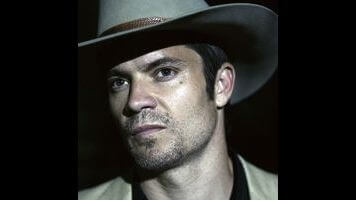Raylan: “Nah. I stopped at a Hardees along the way.”
Beyond the sheer pleasure of the language—Raylan’s glorious prayer (“Let the image of Jared’s brain matter on that windshield not dampen our appetite…,” et al.) would make great fodder for actors looking for fresh monologues—the latest Raylan-Boyd showdown puts their rivalry at the show’s center, where it belongs. Tim Olyphant and Walton Goggins have great chemistry—greater, I’d submit, than the sparks between Raylan and his past and current loves, Winona and Ava. And beyond that, the writers have done excellent work in complicating their rivalry and making them worthy, equally cagey adversaries. Who knows if Boyd can stay out of jail (or stay alive, period) forever, but his quick consolidation of power has raised the threat level on the show to Red, with just a few episodes remaining.
That opening finds Boyd in backwoods Kentucky, leading a “flock” of ne’er-do-wells who are dim, impressionable, and easily manipulated—just like his gang of neo-Nazis. Of course, no one who knows Boyd buys his prison conversion, and his speech about using the carrot instead of the stick gives the game away. (Though he’s not above the coercive powers of brute force, when necessary, as we’ve just seen him threaten a meth-head at gunpoint.) Boyd’s carrot strategy is this: Establish himself as the charismatic voice of one ideology or another (neo-Nazism before, now Christianity) and make a redneck militia out of his converts. When Boyd resolves to take out a meth lab—no doubt a territorial threat to him, as he ramps up his own criminal operation—he can easily convince his followers they’re doing God’s work, ridding the world of this terrible scourge.
500 words into this recap, and I still haven’t mentioned Stephen Root? Root has been popping up on TV shows like crazy the past couple of years, doing memorable character turns on True Blood and Pushing Daisies, and he gave tonight’s A-story a lift. It doesn’t hurt to have an intro that good, with a young vixen “sucking” the poison out at his bedside, but Root makes a strong impression as Mike “The Hammer” Reardon, an eccentric judge whose tough sentencing has made him more than a few enemies. Following the snake threat, “The Hammer” has called on Raylan specifically for security detail, feeling he and Raylan, both gunslingers, have a lot in common. (“The Hammer” wears only a sidearm strap and a skintight red bathing suit under his robe, which says everything about his judicial style and his predilection for sexytime with strippers and other young persuadables.) The judge feels he has a natural ally in Raylan: After all, who’s more “tough on crime” than the Old West, quickdraw type behind that infamous Miami shooting?
And therein lies the theme to this week’s episode, which presents Raylan with disturbing characters who test his moral boundaries. For the judge to believe he’s simpatico with Raylan’s values clearly bothers our hero, who can see how easily power can be abused and perverted in the name of justice. No doubt he feels like he walks the line, but the judge, in requesting him specifically for his gunslinging reputation, serves as his grotesque mirror image. (And Root, one of the best character actors around, plays “The Hammer” with an inspired, hilarious Fall-of-Rome slothfulness.) We see Raylan’s limits tested again later, when Otis, the once and current faux-Jamaican pot dealer whose “church” was blown away in the pilot, offers to ID Boyd if Raylan shows him a picture. To his credit, Raylan pulls back from the brink of total corruption (“I’m not that guy”), but we can see how someone who redraws the lines and administers the law on their own terms can lose his moral compass. (See also: Vic Mackey, The Shield.) Raylan isn’t at that point yet, but in this episode, he can see off the edge of the cliff.
Stray observations:
• The text of Raylan saying grace: “Dear Lord, before we eat this meal, we ask for forgiveness for our sins, especially Boyd, who blew up a black church with a rocket launcher and afterwards shot his associate Jared Hale in the back of the head on Tates Creek Bridge. Let the image of Jared’s brain matter on that windshield not dampen our appetite but may the knowledge of Boyd’s past sins help guide these men. May this food provide them with all the nourishment they need, but if it does not, may they find comfort in knowing the United States Marshals Service is offering $50,000 to any individual providing information that will put Boyd back in jail.”
• Nice little mini-story about Virgil, the ex-con seeking revenge on the judge. 15 years for possession with intent may not have earned him a spot in the “Top 50” convicts most likely to seek retribution, but we can see the wreckage a sentence that extreme has done to his life.
• Liked the detail of how sloppy the judge was in drawing his handgun on Virgil. Despite his tough-guy image, that kind of violence is better left to the professionals.
• Overall, the show has been settling into a nice balance of episodic A-stories and serialized movement, with the latter occasionally taking over. Casual viewers and fans should both leave pretty satisfied.






![HBO teases new Euphoria, Larry David, and much more in 2026 sizzle reel [Updated]](https://img.pastemagazine.com/wp-content/avuploads/2025/12/12100344/MixCollage-12-Dec-2025-09-56-AM-9137.jpg)


































